095: VAMOS COMPRAR UMA ARMA?
entrevista com dave cowen | quem traduziu | dindim | an interview with dave cowen | fim
O casal Maggie e Adam sofre um assalto à mão armada. Os assaltantes não levam só suas carteiras, levam também sua paz de espírito. Maggie acha que eles precisam comprar uma arma de fogo para se defender; Adam é terminantemente contra armas, mesmo depois do assalto.
Os dois moram em Austin, Texas, a cidade que vive no equilíbrio entre uma grande população da esquerda progressista e um dos estados mais fortes da direita conservadora nos EUA.
Maggie e Adam, digamos assim, tendem para a esquerda cirandeira. Ela é produtora na NPR, ele é orientador vocacional. Os dois são veganos e valorizam “a expressão do emocional”. Quando a polícia pede uma descrição de quem o assaltou, Adam diz que “são jovens cujo contexto os levou a uma decisão errada no dia de hoje, mas que um dia podem evoluir e virarem pessoas melhores”.
Eles querem ter um filho, mas têm medo do mundo que ele vai herdar.
Maggie quer uma arma. Adam diz que gente como eles não tem armas.
Assim começa SHOULD WE BUY A GUN?, de Dave Cowen e Gabriel Wexler. A gente devia comprar uma arma?
Spoiler: eles compram. E a arma é decorada como a bandeira americana. Ainda estamos no capítulo 2 de 9.
Conheci SHOULD WE BUY A GUN lendo o substack de
, onde ele fez entrevistas com um monte de gente dos quadrinhos quando estava se preparando para lançar sua primeira graphic novel - e, depois de ela lançada, continua entrevistando. É a newsletter .Foi lendo a SerioComics que descobri o texto maravilhoso sobre Calvin & Haroldo que traduzi na virapágina 050:
Citei minha inspiração naquela newsletter. Dave começou a conversar comigo. Papo vem, papo vai, o quadrinho dele foi lançado e ele quis me mandar um exemplar. Eu disse que ele era louco e ia sair muito caro. De repente o gibi chegou pelo correio.
Eu li SHOULD WE BUY A GUN?. É um episódio dos Simpsons, de quando Simpsons era bom, hilário, cortante. Lembra as graphic novels do Kyle Baker, com aquela ironia fina que crava no peito. E é um retrato sério da discussão sobre controle das armas de fogo nos EUA - que não é mais uma discussão esquerda versus direita.
Como explica Reagan - a amiga de Maggie e Adam, uma mulher negra lésbica que tem um filho bebê chamado Barack e cuja esposa latina Eva faz guacamole orgânico - depois de dizer que elas têm armas em casa: “Temos um bebê. Não esqueçam que somos uma família interracial queer no Texas. Não tem como dar chance pra gente virar crime de ódio.”
O Dave me perguntou: “Você leu? E aí?” Falei que queria saber mais sobre esse debate das armas nos EUA e o quadrinho. Ele queria saber mais sobre quadrinho no Brasil. Ele é o cara das entrevistas. Quem sabe um entrevista o outro?
Então que: hoje sai minha entrevista na
:https://seriocomics.substack.com/p/brazil-comics-catalogue-seriocomics
E, logo abaixo, minha entrevista com o senhor
:(You can read this interview in English at the end of this edition.)
(You can read this interview in English at the end of this edition.)
(You can read this interview in English at the end of this edition.)
Como brasileiro que acompanha filmes, TV, literatura dos EUA, escuta seus pundits (sou fã do Colbert) e lê notícias daí, às vezes parece que há uma regra pétrea no seu país: se você é de esquerda, você é contra as armas; se é da direita, é a favor. Mas, como sua HQ mostra, parece que tem outras nuances.
Um amigo resumiu assim: nos EUA, ser de direita é ter um monte de armas em casa; ser de esquerda é ter só uma. Você diria que essa é uma forma mais clara de entender a relação entre armas e posicionamento político nos EUA?
Vou te dizer o seguinte: quando faço anúncios de SHOULD WE BUY A GUN no Facebook, sempre aparece um troll perguntando: “Só uma?!” Essa piada meio que comprova o que você está dizendo. E, sim, muita gente de esquerda aqui deixou de ser totalmente anti-armas. Mas também conheci, há pouco tempo, uma pessoa de direita que reduziu a quantidade de armas em casa depois de ter filhos.
No fundo, esse quadrinho trata de se permitir, de estar aberto a qualquer mudança. O que é difícil de transmitir num anúncio do Facebook!
É assim desde que você nasceu? Ou essa divisão política quanto às armas de fogo - e as posturas quanto às armas - mudou nos últimos anos?
Eu tenho mais de quarenta, então já tive tempo para notar que sim, teve mudanças. Mas não sou acadêmico nem especialista, sou só artista. Quando comecei esse projeto, por volta de 2013 - e eu sendo um Millennial - eu via muito o lado contra as armas, um movimento de reação ao aumento de tiroteios em escolas e em público, contra o aumento da violência policial.
Acho que, por volta de 2020, com a COVID e o crescimento do autoritarismo (ou da percepção de autoritarismo), eu acho que se começa a ver a volta da resistência armada de esquerda, do vigilantismo. Ou é uma coisa que vem da insegurança com a economia e a incerteza da pandemia, que levou as pessoas a quererem proteção individual.
Então sim, houve uma mudança. E acho que SHOULD WE BUY A GUN? capta uma parte dessa evolução.
Eu sei que seu quadrinho é, pelo menos em parte, uma sátira, e que Maggie e Adam são personagens inventados que servem à sua discussão. Mas o quanto eles se aproximam de gente real? Não no sentido de eles serem gente que você conhece, mas no sentido de: você conhece gente assim? Ou algum leitor lhe disse: “Eu conheço gente exatamente que nem essa”?
Para ser sincero, Maggie e Adam foram inspirados, em parte, em mim e numa parceira com quem vivi dez anos. Teve um momento em que o quadrinho até tinha um subtítulo: Um SerioComic Semiautobiográfico. E a inspiração foi em uma desavença entre nós que foi real. Mas não dá para reduzir nem ela nem eu a esses personagens. Não somos nós. São idealizações, caricaturas, arquétipos. Não são a vida real.
Dito isso, sabe a cena no clube de tiro? [Reproduzida em parte nas imagens.] Começa praticamente igual ao que aconteceu quando nós fomos. Algumas brigas vieram do que a gente viveu de pior. E também tem momentos de carinho a que eu fiz jus.
Mas, no sentido mais geral, acho que os personagens têm a ver com um tipo de americano de esquerda ou progressista que hoje está na faixa dos 30 anos, começo dos 40. Como levou anos para o projeto sair, é como uma cápsula do tempo de um casal Millennial, que não é mais o centro da cultura que era quando eu comecei a escrever.
Qual é a relação que você tem, pessoalmente, com armas de fogo? E quanto a seu colaborador, Gabriel Wexler? Vocês cresceram com armas em casa? Vocês têm armas?
Nunca contei isso numa entrevista, mas só fui dar um tiro pela primeira vez na minha vida em 2023. Quase dez anos depois de começar a escrever a HQ. E foi ali que eu consegui terminar o roteiro.
Minha família nunca teve armas. Meu pai nunca me ensinou a usar uma arma. O pai do pai da minha mãe foi morto acidentalmente com uma arma pelo próprio irmão. Ela foi assaltada à mão armada mais de uma vez. Por isso, sempre fomos completamente anti-armas. Eu era forte no pacifismo.
Quando eu finalmente dei um tiro, pra ser sincero, chorei um pouquinho. Quis que meu pai tivesse me ensinado. E pensei: se eu tiver um filho, eu vou ensinar. Não porque eu quero ter uma arma, mas porque é uma competência que você precisa ter na vida. Não dá pra fingir que elas não existem.
Eu gosto de escolher músicas no aleatório quando quero achar um sentido e, quando eu estava voltando para casa esses dias, caiu um poema do Borges — sei que ele não é brasileiro, mas é vizinho! Chama-se Del Rigor de la Ciencia [“Sobre o rigor da ciência”, que se lê em HISTÓRIA UNIVERSAL DA INFÂMIA] e fala de como o mapa não é o território. Aquilo me pegou. Acho que pessoas que vivem só nas suas ideias, só na ideologia, seja de direita ou esquerda, esquecem que a realidade é diferente dos mapas que têm na mente.
Na Comic Con de Pasadena, conversei com um ex-agente da CIA. Ele me contou que não andar armado salvou sua vida. Perguntei se ele achava que eu tinha uma arma. Ele disse: depende. Se você tem esposa e filhos, talvez tenha. Mas se não, como era o caso dele, provavelmente não…
Aliás, eu nem sei se a minha última pergunta é pergunta que se faça a alguém nos EUA. É? Não é? Posso ofender alguém perguntando isso?
Haha, eu não me ofendo. Talvez tenha sentido um pouco de vergonha em algum momento. Afinal, passei 11 anos nesse livro e só dei um tiro no décimo. Com certeza tem alguma coisa de psicológico aí (risos).
Quando finalmente atirei, tive um sonho em que saía de um prédio que parecia a antiga escola de cinema da University of South California, e na fachada estava escrito Escola de Cinema e da Vida. E não foi só um sonho normal. Foi um sonho erótico (risos). Então, como você pode ver, sou o tipo de americano que não se ofende com muita coisa ;)
Pode me contar um pouco sobre como foi a colaboração com Gabriel Wexler? Especialmente sobre pontos de discordância, já que vocês são de lados opostos do espectro político. Como vocês se resolveram em discussões ideológicas ou criativas?
Antes de eu dar aquele tiro, tinha vezes que o Gabriel dizia: “Mas não é assim que é.” E eu retrucava: “Bom, é assim que é nesta história.” Como era eu que estava contratando-o, pagando por página - ou seja, era mais ele fazendo um frila pra mim do que uma parceria meio a meio - ele não discutia muito. Ele me dizia: “Você é o cliente. Mas… não é assim que funciona.”
Quando finalmente dei o tiro, reescrevi aquele trecho inteiro. E outros. Acho que ele ficou contente por estar certo, talvez um pouco irritado por ter que redesenhar. (risos)
Mas um influenciou o outro. Acho que ele não tem as mesmas opiniões que tinha no começo do nosso trabalho. A frase “a violência nunca é a resposta, mas, quando é, é a única” veio dele.
Acho que, como o quadrinho apresenta várias perspectivas e não dá uma resposta única, o que tivemos não foram tanto discordâncias, mas sim uma curiosidade mútua que alimentou essa variedade de perspectivas.
Por enquanto, SHOULD WE BUY A GUN? é uma publicação independente. Você tentou vender o projeto a editoras, seja pequenas ou grandes? Se aconteceu, teve algum retorno sobre o que elas pensam de tratar da questão de armas de fogo em quadrinhos?
Boa pergunta. Trabalhei com um agente, Kevin Moran, que apresentou o projeto a editoras grandes, médias e pequenas. Infelizmente, as respostas que recebemos foram com base na proposta, não sobre o quadrinho pronto. E o comentário geral foi de que acharam a proposta “limitada”.
Chegamos a conversar com uma editora muito bacana, mas que foca em graphic novels progressistas. E na época, não achei que SHOULD fosse só um livro progressista… o que talvez tenha sido um erro da minha parte. Mas eu queria que ele parecesse aberto, que mostrasse nuances, algo que cruzasse ideologias — independentemente de quem fosse o editor.
Então fui pelo caminho independente. É mais difícil… a distribuição é bem mais complicada do que eu imaginava. Tipo: AARRRGGHHH! Mas era a opção que parecia mais fiel ao projeto naquele momento. Ainda tenho esperança de trabalhar com editoras no futuro. Estou até pensando em adicionar uma página de texto extra ao final de cada capítulo, tipo um metacomentário, para uma possível reedição.
Então, se você é uma editora e quer distribuir o livro, por favor, entre em contato. Sério, de verdade: seriocomicspublishing@gmail.com.
Estamos numa onda de graphic novels sobre “grandes temas” ou “mundo real” nos EUA e na Europa, mas eu não lembro de nenhuma que trate de armas de fogo. (Uma busca na Amazon me levou a NUMB TO THIS: MEMOIR OF A MASS SHOOTING [Sem reação: lembranças de um tiroteio], de Kindra Neely, que eu não li.) Você conhece outros quadrinhos que tratam do assunto? Indicaria algum?
Sim! Eu inclusive falei de NUMB TO THIS na SerioComics!
É um quadrinho poderoso. Tem a perspectiva de uma sobrevivente. Ela viveu um tiroteio [em uma faculdade no Oregon]. É um quadrinho muito diferente do meu, que propõe um debate. Foca na experiência vivida — que infelizmente já aconteceu com gente demais por aqui. Recomendo muito.
Mas você tem razão, não existem muitas graphic novels sobre o tema. E foi por isso que me esforcei tanto pra lançar SHOULD WE BUY A GUN? em 2025. Queria ajudar a preencher essa lacuna na narrativa gráfica.
Também tem IF ANYTHING HAPPENS I LOVE YOU, que é um livro infantil curtinho, também contado a partir da perspectiva de vítimas — no caso, da família que perdeu uma criança. É de Will McCormack, Michael Govier e Youngran Nho. Virou um curta animado que ganhou o Oscar [Se algo acontecer… te amo - está na Netflix]. Recomendo esse também.
Além disso, o Kevin Wolf, do site graphicmedicine.org, publicou recentemente um ótimo levantamento sobre quadrinhos que abordam armas nos EUA. Ele incluiu SWBAG?, o livro da Kindra, e mais três títulos. O link: https://www.graphicmedicine.org/comic-reviews/guns-in-the-united-states-stories-of-trauma/
Eu sei que a pergunta é gigante, considerando tudo que eu já li no seu Substack. Mas: por que quadrinhos? Pessoalmente, por que você faz quadrinhos?
Tenho pensado muito nisso. A real é que eu queria ser roteirista de cinema. Eu amava filmes. Mas parece que meu caminho não vai ser esse. Dito isso, sempre preferi histórias visuais e com diálogos, mais do que prosa ou poesia. E penso nos quadrinhos como meu jeito de fazer cinema, só que em livro.
Com quadrinhos, posso fazer as coisas do meu jeito, como um autor, sem abrir mão da minha perspectiva. Não preciso de milhões de dólares, agentes, atores, estúdios, uma equipe enorme, nem me limitar por tempo e espaço. É uma forma viável de contar minhas histórias exatamente como eu quero. Tem a profundidade dos livros com o charme superficial dos filmes.
Agora estou montando uma “grade de projetos”, como faria um roteirista/diretor — só que em quadrinhos. Tenho em andamento TENNIS VS. PICKLEBALL, um YA romântico entre uma estrela do tênis estressada e um folgado, meio THE PRINCE OF TENNIS com O PRÍNCIPE E A COSTUREIRA.
Também tenho THE ENNEAGRAM SUPERHEROES [Os super-heróis do eneagrama], com o qual eu posso ensinar os nove arquétipos do eneagrama de forma educativa e divertida — tipo CAPITÃO PLANETA com DIVERTIDA MENTE.
E estou trabalhando em THE FIRST WOMAN I LOVED AFTER I QUIT PORNOGRAPHY [A primeira mulher que amei depois de largar a pornografia], que… nossa, difícil de explicar esse, mas lembra comédias românticas dos anos 2000, tipo BRILHO ETERNO DE UMA MENTE SEM LEMBRANÇAS, com um pouco de PAGANDO POR SEXO do Chester Brown. É minha tentativa de ensinar à próxima geração como lidar com essas coisas.
E toda semana leio graphic novels e entrevisto os autores no SerioComics. Estou mesmo envolvido com a comunidade dos quadrinhos, aprendendo muito, e quero ficar sempre avante, a todo vapor, contando histórias do meu jeito, nessa mídia.
Para terminar: como está a vida nesses dias de Trump 2: O Inimigo Agora é o Mesmo de Antes?
Sinceramente, essa é a pergunta mais difícil. Às vezes sinto que estamos vivendo em PERSÉPOLIS, vendo o país numa transformação brusca rumo a uma ditadura fundamentalista. E temos que nos preparar para lutar ou fugir.
Tem outros dias em que eu nem odeio mais o Trump. Não como odiava no primeiro mandato. Isso foi antes do meu despertar espiritual, quando eu era mais político e odiava o “outro lado”, quase literalmente. Muito de SHOULD WE BUY A GUN? trata de aprender a viver com divergências radicais, tanto nos relacionamentos entre cada pessoa quanto na sociedade.
Eu vou aos protestos, eu faço minhas doações à ACLU [União Americana pelas Liberdades Civis], tento fazer minha parte nos quadrinhos. Eu trago quadrinhos queer e trans para meu Substack, assim como material anti-autoridade, de tudo um pouco. E faço outras coisas para defender o que eu acho certo. Mas, por algum motivo, não ando mais com aquela raiva ou aquele impulso contra o outro lado enquanto faço aquilo em que acredito.
Mas também tento não falar de nada em que eu não acredite.
E o que eu acredito, pelo menos hoje, é que os Estados Unidos sempre foram o que há de pior e o que há de melhor, como qualquer lugar. E que talvez exista motivo para o que está rolando. E eu sigo adiante… com meus chavões de quem vê a luz no fim do túnel ;0
Dave Cowen é autor de nove livros, já colaborou com a New Yorker e com a McSweeney’s, era avaliador de roteiros de cinema e, como mostra a entrevista acima, está se encontrando nos quadrinhos. Como mostra seu Substack
, se encontrando muito bem. Recomendo muito acompanhar.(Enquanto estávamos combinando essa entrevista, Dave foi entrevistado por um dos meus heróis, Henry Jenkins.)
Gabriel Wexler, que desenhou SHOULD WE BUY A GUN, já trabalhou com jornais e revistas, e faz storyboards para cinema e TV, além de dar aulas de artes. Foi seu primeiro quadrinho.
Você compra SHOULD WE BUY A GUN? aqui.
Infelizmente, hoje estou sem tempo para fazer as outras seções da newsletter. Mas tinha que falar de mais uma coisa: o Manifesto do Quem Traduziu.
É a lista de reivindicações montada por um grande grupo de tradutoras do mercado editorial, que inclui coisas de que eu e colegas estamos sempre falando (e que também tento passar aos meus alunos): respeito à lei do direito autoral, horizontalidade na discussão de contratos, correção periódica dos valores de lauda ou página. Para todas as editoras, não só as pouquíssimas que seguem essas ideias.
Eu acrescentaria uma e outra demanda, mas não tiraria nada do que o manifesto propõe. Já assinei e recomendo a colegas que assinem. Se você não é tradutor ou tradutora e gosta de livros e quadrinhos, sugiro divulgar: o link para o manifesto é este.
Como disse nosso amigo Alan Moore na última virapágina: “Quando reinventa este material em outra língua, o tradutor ou tradutora torna-se, na prática, autor ou autora de uma nova obra e deveria igualmente depositar confiança em si e nos seus processos.” Ele assinaria.
Os links abaixo são de trabalhos meus que foram lançados há pouco tempo ou que serão lançados em breve. Comprar pelos links da Amazon me rende uns caraminguás. Se puder, use os links. As datas podem mudar a qualquer momento e eu não tenho nada a ver com isso.
agora, no Catarse:
WILL EISNER: UMA BIOGRAFIA EM QUADRINHOS: de Stephen Weiner e Dan Mazur, a biografia de um mestre dos quadrinhos - em quadrinhos. Lançamento simultâneo EUA/Brasil. Dá para comprar em combo com A ESTRANHA MORTE DE ALEX RAYMOND, que eu também traduzi.
A campanha vai até 20/7ÔNIBUS 2 + O ESPELHO DOS SONHOS: dois trabalhos de Paul Kirchner, um deles em lançamento simultâneo Europa/Brasil, um exclusivo do Brasil. Dá para comprar separado, junto ou em combo com o primeiro ÔNIBUS. E tem um brinde exclusivo para quem apoia no Catarse: o MICRO-ÔNIBUS. Traduzi tudo para a Risco.
A campanha vai até 7/7.
em junho
SAPIENS VOL. 3: OS MESTRES DA HISTÓRIA, Yuval Harari, David Vandermeulen e Daniel Casanave, quadrinhos na cia.
IRMÃOS MENÉNDEZ: SANGUE DE FAMÍLIA, Robert Rand, darkside
MONSTROS DA UNIVERSAL: DRÁCULA VIVE, James Tynion IV, Martin Simmonds, darkside
MONSTROS DA UNIVERSAL: O MONSTRO DA LAGOA NEGRA, Ram V, Dan Watters, Matthew Roberts, Trish Mulvihill, darkside
MONSTROS DA UNIVERSAL: FRANKENSTEIN, Michael Walsh, Toni Marie Griffin, darkside
CONAN, O BÁRBARO: A ERA CLÁSSICA VOL. 9, Val Semeiks, Michael Higgins, Ron Lim e outros, panini
O GATO PETE VIAJA NA MAIONESE, de Kimberly e James Dean, harpercollins brasil
em julho
GUERRA EM GAZA, Joe Sacco, quadrinhos na cia.
em agosto
CONAN, O BÁRBARO 9, Jim Zub, Danica Brine, panini
A ESPADA SELVAGEM DE CONAN 3, Cary Nord, Frank Tieri e outros, panini
ainda este ano (já anunciados pelas editoras)
ESTÁ TUDO BEM VOL. 2, Mike Birchall, suma
GIBI S.A., Shawna Kidman, veneta
TOTEM, Laura Pérez, nversos
LIMBO, Deb JJ Lee, nversos
CRUMB: A CARTOONIST’S LIFE, dan nadel, todavia
vem aí
HOW TO e WHAT IF 2, Randall Munroe, companhia das letras
KRAZY & IGNATZ VOL. 2: 1919-1921, George Herriman, skript
FEEDING GHOSTS (a vencedora do Pulitzer!), Tessa Hulls, quadrinhos na cia.
mais BONE de Jeff Smith (e amigos), todavia
ALICE NO PAÍS DAS MARAVILHAS e ATRAVÉS DO ESPELHO, Lewis Carroll
+ Adrian Tomine, Dan Clowes, Shaun Tan, Will Eisner, Rachel Pollack
+ Gato Pete, Lore Olympus, Conan, Kull, Primeiro Gato no Espaço
etc. etc. etc.
Todas as minhas traduções: ericoassis.com.br
(The English version of Dave Cowen’s interview starts here.)
(The English version of Dave Cowen’s interview starts here.)
(The English version of Dave Cowen’s interview starts here.)
Maggie and Adam, a couple living in Austin, Texas, are victims of an armed robbery. The assailants don’t just take their wallets — they take their peace of mind, too. Maggie thinks they need to buy a gun to protect themselves; Adam is firmly against guns, even after the robbery.
They live in Austin, Texas — a city known for its progressive leanings, located in a state where conservative politics remain dominant.
Maggie and Adam, let’s say, lean toward the peace-and-love left. She’s a producer at NPR; he’s a career counselor. They’re both vegan and value “emotional expression.” When the police ask for a description of the assailants, Adam replies, “They looked like the kind of young men whose circumstances led them to make a poor choice today but could definitely evolve into better people later in life.”
They want to have a child, but they’re afraid of the world that child will inherit. Maggie wants a gun. Adam says people like them don’t own guns.
That’s how SHOULD WE BUY A GUN?, a graphic novel by Dave Cowen and Gabriel Wexler, begins.
Spoiler: they do buy one. And the gun is decorated like the American flag.
We’re still in Chapter 2 (of 9).
I first heard about SHOULD WE BUY A GUN? through
’s Substack newsletter, where he interviewed a bunch of people from the comics world as he was getting ready to launch his first graphic novel — and even after the launch, he’s still interviewing comics folks. His newsletter is .It was through SerioComics that I came across the wonderful piece on Calvin & Hobbes, which I translated for virapágina 050:
I mentioned SerioComics in that edition. Dave reached out to me. One thing led to another, his comic got released, and he wanted to send me a copy. I told him he was crazy and that it would be way too expensive. Suddenly, the comic showed up in my mailbox.
I read SHOULD WE BUY A GUN?. It feels like an episode of THE SIMPSONS - back when THE SIMPSONS was hilarious, sharp, biting. It reminds me of Kyle Baker’s graphic novels, with that kind of fine irony that hits you right in the chest. And at the same time, it’s a serious portrait of the gun control debate in the U.S. — which is no longer just a left-versus-right issue.
As Reagan — Maggie and Adam’s friend, a Black lesbian with a baby named Barack and a Latina wife who makes artisanal guacamole — puts it, right after casually mentioning they own guns:
So Dave asked me, “Did you read it? What did you think?” I said I wanted to know more about the gun debate in the U.S. and his and Wexler’s comic. He was curious about comics in Brazil. He’s the interview guy. So, could I interview him and vice-versa?
Today, my interview is being published on
, and you can read it at:https://seriocomics.substack.com/p/brazil-comics-catalogue-seriocomics
And now, my interview with Mr.
:As a Brazilian who follows U.S. media (movies, TV, fiction), listens to your pundits (I'm a Colbert fan), and reads American news, it sometimes feels like there's a hard rule in your country: if you're left-wing, you're anti-gun; if you're right-wing, you're pro-gun. But as your book shows, there seems to be much more nuance than that.
A friend of mine once put it like this: in the U.S., being right-wing means you have a lot of guns at home; being left-wing means you only have one. Would you say that’s a more accurate take on the relationship between guns and political identity in the U.S.?
I'll tell you. When I run Facebooks ads for SHOULD WE BUY A GUN? Trolls often reply: “Just one?!” That joke kind of proves your point. And, you're right, many left-wing people are no longer completely anti-gun here. But I also recently met a right-wing person who reduced his gun stock in their home when they had children. So this book, at its core, is really about letting yourself be open to any change. But yeah, that's hard to get across in a Facebook ad! LOL
In your lifetime, has it always been like this? Or has this political divide over guns - and attitudes toward guns - shifted in recent years?
I'm over 40, so I’ve had enough time now to notice changes in my lifetime. But I am not an academic or an expert, I am just an artist. When I first started this project around 2013, as a Millennial, there was a very stark anti-gun side, a movement against the rise of school and public shootings, and the increases in police violence. But I think around 2020, with COVID and with the rise of perceived authoritarianism, I do think you are starting to see a return to armed leftist resistance, vigilantism, or even just the insecurity of the economy and the uncertainty of the pandemic, leading people to want to protect their personal lives.
So yes, there’s been a shift, and I think SHOULD WE BUY A GUN? captures part of that evolution.
I understand that your book is at least partly satirical, and that Maggie and Adam are constructed characters whose journeys serve your broader argument. But how close would you say they are to real-life people? I don’t mean whether they’re based on anyone you know personally — just whether you'd say there are exactly people like them. Have any readers told you, “I know someone exactly like that”?
Honestly, Maggie and Adam were drawn partly from me and a partner I was with for a decade. At one point, the book had a subtitle, A Semi-Autobiographical SerioComic. And it was inspired by a difference in our lives. But she and I can't be reduced to those characters. They’re not us. They’re idealizations, cartoons, archetypes. Not real life.
That said, the scene at the gun range? It starts out pretty much like what happened when we went. There's some quarreling lifted from our worst moments. And also some tender moments were celebrated too.
But more broadly, it does speak to a general kind of liberal or progressive Americans who are probably now in their 30s or early 40s. In many ways, because the project took 11 years, it's a bit of a time capsule of a Millennial couple that's not the center of culture like it was when I started the project.
What’s your personal relationship with guns? And what about your collaborator on the graphic novel, Gabriel Wexler? Did either of you grow up with guns in the house? Do either of you currently own any?
I haven’t shared this in an interview before. But I didn’t shoot a gun until 2023, which was almost 10 years into making the book. That act is what finally allowed me to finish it.
My family never had guns growing up. My dad never taught me how to use one. My mom’s father’s father was killed by his brother with a gun by accident. She was robbed by a gun a few times. So we were just incredibly anti-guns. My pacifism was intense.
When I finally shot the gun, I remember crying a bit, to be honest, and wishing my dad had taught me how, and thinking if I had a child, I would teach them how. Not because I want to own a gun, but because it’s a life skill. You can’t ignore that they exist.
I’m really into shuffling songs for meaning, and I got a Borges poem as the first song on the way home. I know he’s not Brazilia,n but he’s nearby! And it was called “Del Rigor de la Ciencia” and it’s about how the map isn’t the territory. That hit me. I think people who live in their minds, in ideology, whether they are right or left, can forget that reality is different from our mind maps.
I was selling my book at Pasadena Comic Con last weekend, and I talked to a former CIA agent. And he told me a story about how not carrying a weapon saved his life. I asked him if he thought I owned a gun. And he said, it depends, if you have something to protect, like a wife and kids, I could see you having one. But if you don’t, like I didn’t, I wouldn't…
By the way, I’m not even sure if it’s appropriate to ask the last question to an American. Is it? Do people get offended by that question?
Haha, I don’t get offended. I might’ve been embarrassed at one point, spending eleven years on this book and only shooting a gun in year ten… Clearly, something psychological was going on. LOL.
When I finally did shoot the gun, I had a dream where I came out of a building that looked like my old USC film school, and it said The School of Cinema and Life. And, well, it was not just a regular dream. It was a wet dream LOL. So as you can tell, I’m the kind of American that doesn’t get offended by much ;)
Could you tell me a bit about how you and Mr. Wexler worked together? I’m especially curious about any points of disagreement, given that you come — deliberately — from opposite sides of the political spectrum. How did you handle creative or ideological compromises? Can you tell me any story about this?
Before I shot the gun, Gabriel would sometimes say, “This just isn’t what it’s like.” And I’d push back. “Well, this is how it is in this story.” Since I was hiring him per page…more of a work-for-hire than a 50/50 partner…he wouldn’t argue much. He’d say, “You’re the client. But... It’s still not how it is.” After I finally did shoot, I rewrote that whole section…and a few others too…I think he was amused that he’d been right, and maybe a little annoyed about having to redraw it. LOL.
But we influenced each other. I don’t think he has the same opinions as when we started. The line “Violence is never the answer. But when it is. It’s the only one.” That was him.
I think because the book presents a lot of different perspectives. And doesn’t have one answer. But asks you to re-think things for yourself. It wasn’t so much disagreements but curiosity that then informed the wide variety of perspectives.
At the moment, SHOULD WE BUY A GUN? is an independent project. Did you pitch it to any small, mid-sized, or major publishers? If so, did you receive any feedback specifically about addressing the gun issue in comics?
Great question. I worked with an agent Kevin Moran, who did pitch it to major, mid-sized, and small publishers. Unfortunately, the responses we did get were mostly from the pitch packet, not the actual book. And the main comment was that it felt “narrow.”
We kind of connected with someone great, but they focus on progressive graphic novels. And at the time, I didn’t feel like this was just a progressive book…which may have been a mistake… But I want it to feel open, nuanced, and cross-ideological, no matter who the publisher is.
So I went independent. It’s a harder path…distributions is much tougher than I thought, like Ahhhh. But it felt truer to the project at the time. I still hope to work with publishers in the future. And I am thinking of adding an extra prose page after each chapter, kind of a meta-commentary for a repub. So if you’re a publisher who wants to distribute it widely, please seriously help and reach out at seriocomicspublishing@gmail.com
There’s been a wave of “big issue” or “real-world” graphic novels coming from U.S. publishers lately, but I can't recall many that tackle guns. (A quick Amazon search led me to Kindra Neely’s NUMB TO THIS: MEMOIR OF A MASS SHOOTING, but I haven’t read it yet.) Are you aware of other comics that address this topic? Would you recommend any?
Yes! I actually featured Kindra Neely’s NUMB TO THIS in my Substack SerioComics, where you and I met. It’s a powerful book from the perspective of a survivor. She lived through a shooting. So it’s very different from a debate book. And focuses on her experience living through what has happened to too many people here. I highly recommend it.
But you’re right, there aren’t many graphic novels about this subject. And that’s why I worked really hard to publish it in 2025. Because I wanted to help fill a gap in graphic literature. There’s also If Anything Happens I Love You, which is a short children’s book also from a victim’s perspective, the family grieving the loss of a child, from Will McCormack, Michael Govier, and Youngran Nho, that was later adapted into a short animated film that won an Oscar. I recommend that one too. Also, Kevin Wolf from graphicmedicine.org just published a great survey of graphic literature about guns in America which included SWBAG? and Kindra’s and 3 other books. Here’s the link!
https://www.graphicmedicine.org/comic-reviews/guns-in-the-united-states-stories-of-trauma/
I know this is a big question, considering all I've read in your Substack, but: Why comics? Personally, why do you do comics?
I’ve been thinking a lot about this. The truth is: I wanted to be a screenwriter. I loved movies. But it seems that’s not my path. That said, I’ve always preferred visual and dialogue-driven stories over prose or poetry. And I think of comics as my way of making movies just in book form. I get to make things in an auteur way without compromising. With comics, I don’t need millions of dollars, agents, actors, studios, a massive crew, time, and space limitations. It’s a sustainable way for me to make my stories exactly how I want them to be. They have the depth of books but the surface charms of films.
So now I’m building a ‘slate’ the way a writer/director would. It’s just comics instead. So I have “Tennis Vs. Pickleball” in the works a YA meet cute between a high-strung tennis star and a laidback dinker that’s kind of like THE PRINCE OF TENNIS and THE PRINCE AND THE DRESSMAKER. I have “The Enneagram Superheroes,” which allows me to teach The Enneagram’s 9 archetypes through a very educational but also entertaining experience, which is kind of like Captain Planet and Inside Out. And I’m also working on “The First Woman I Loved After I Quit Pornography”, which is gosh it’s hard to explain but it reminds me of 2000s romantic comedies like Eternal Sunshine but also PAYING FOR IT by Chester Brown and a way of trying to teach the next generation how to deal with this stuff. And I’m reading graphic novels weekly and interviewing their makers for SerioComics. So I’m really involved with the comics community now, learning a lot, and just going full steam ahead, storytelling my version of the medium whatever that is.
And finally — how are you holding up in these 100+ days of Trump 2: Orange Boogaloo?
This is honestly the hardest question. Sometimes I feel we’re living in PERSEPOLIS, where the country is shifting fast to a fundamentalist dictatorship. And we must be prepared to fight or leave.
Other times, I don’t hate him the way I did in the first term. That was before my spiritual awakening when I was more political and kind of literally hated the other side. A lot of this book is learning how to live with extremely radical differences, both in personal relationships and as a society.
I do protest and do donate to the ACLU and I try to do my part in comics too, I feature queer and trans comics on my Substack, anti-authoritarian work, any and everything. And do a number of other things in support of what I think is right but for whatever reason I don’t carry the anger and charge against the other side anymore as I continue to do things for what I believe.
But I also try not to say anything I don’t believe.
And what I believe, today at least, is America has always sometimes been the absolute worst and the absolute best, just like everywhere, maybe there’s a reason for all this happening, and I carry on…with silver lining platitudes ;0
Dave Cowen is the author of nine books, has published in The New Yorker and McSweeney’s, and — as the interview above shows — is now finding his voice in comics. And, as his Substack
, he’s doing that incredibly well. I highly recommend following his work.(While we were setting up this interview, Dave himself was interviewed by one of my heroes, Henry Jenkins.)
Gabriel Wexler, who illustrated Should We Buy a Gun?, has worked with newspapers and magazines, does storyboards for film and TV, and teaches art. This was his first comic.
You can buy SHOULD WE BUY A GUN at www.shouldwebuyagun.com.
Gostou? Então o que acha de apoiar a virapágina para ela continuar saindo toda semana?
Custa só R$ 16 por mês ou R$ 160 por ano. Dá R$ 3 e uns trocados por edição.
E já ouviu falar dos sorteios para quem colabora com uma assinatura paga? Todo início de mês, uma tradução minha vai para os colaboradores! Teve sorteios na edição 80, na edição 84, na edição 88 e na edição 94.
E mais: com a parceria todavia + virapágina, você pode ganhar um quadrinho da Todavia todo fim de mês. Mais detalhes nessa edição extra.
Você também pode dar uma assinatura virapágina de presente para quem você acha que vai gostar:
Meu nome é Érico Assis. Sou jornalista e tradutor. Escrevo profissionalmente sobre quadrinhos desde 2000, traduzo profissionalmente desde 2009. Sou um dos criadores do podcast Notas dos Tradutores, colaboro com o canal de YouTube 2Quadrinhos e com o programa Brasil em Quadrinhos do Ministério das Relações Exteriores. Dou cursos de tradução na LabPub. E escrevo esta newsletter.
Publiquei dois livros: BALÕES DE PENSAMENTO 1 e 2, disponíveis em formato digital e físico na Amazon.
Tem mais informações no meu website ericoassis.com.br.
Se gostou da edição, por favor, compartilhe. Encaminhe o e-mail ou espalhe o link por aí.
E que você vire ótimas páginas até a semana que vem.


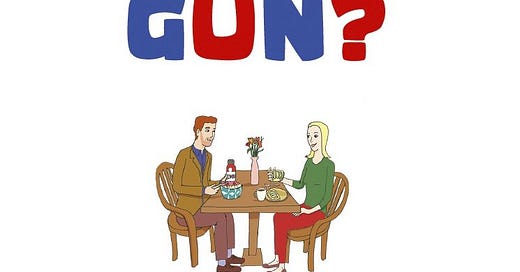

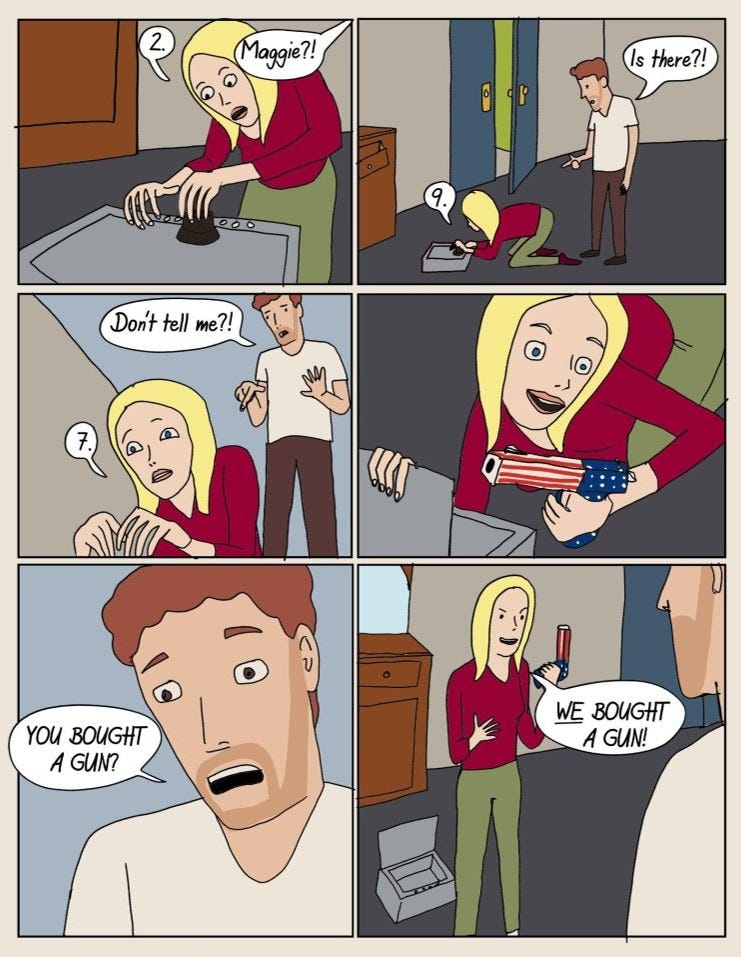

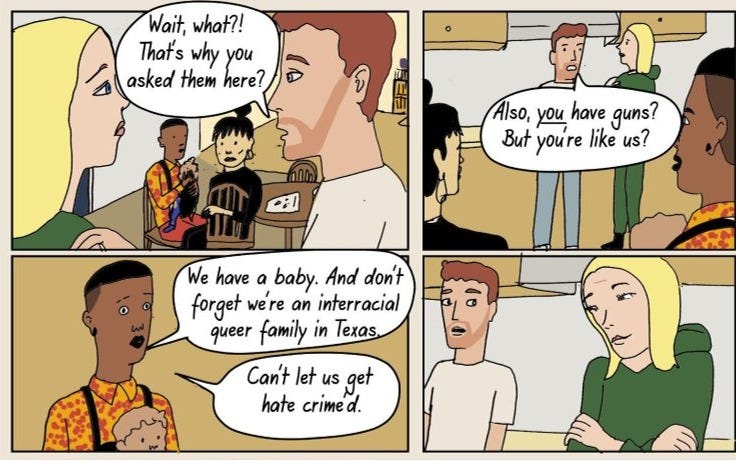
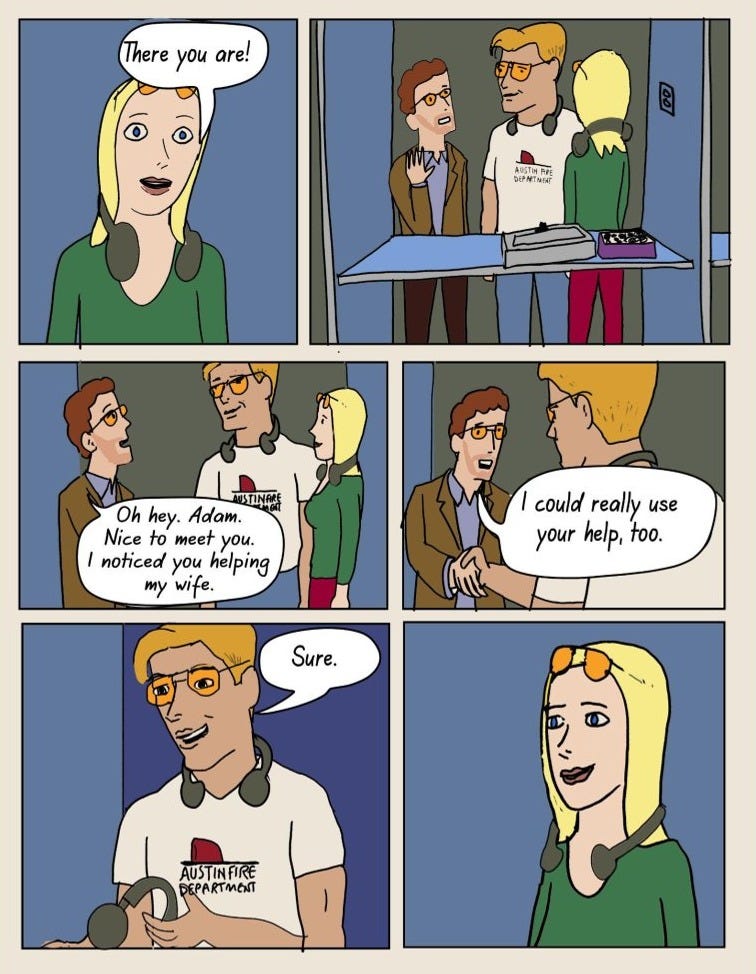
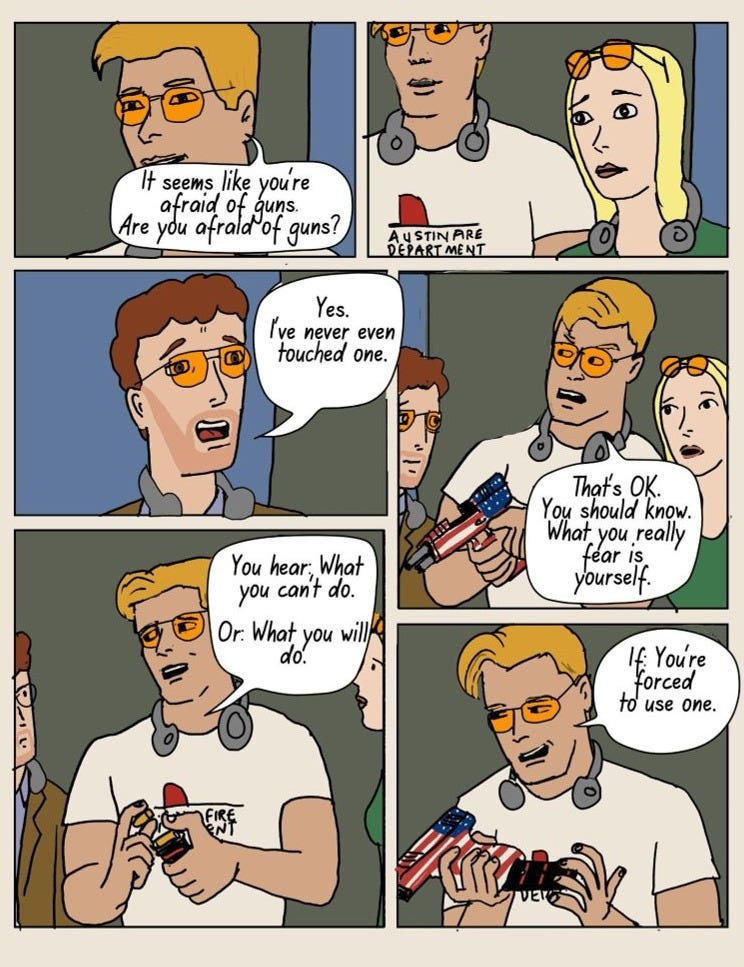
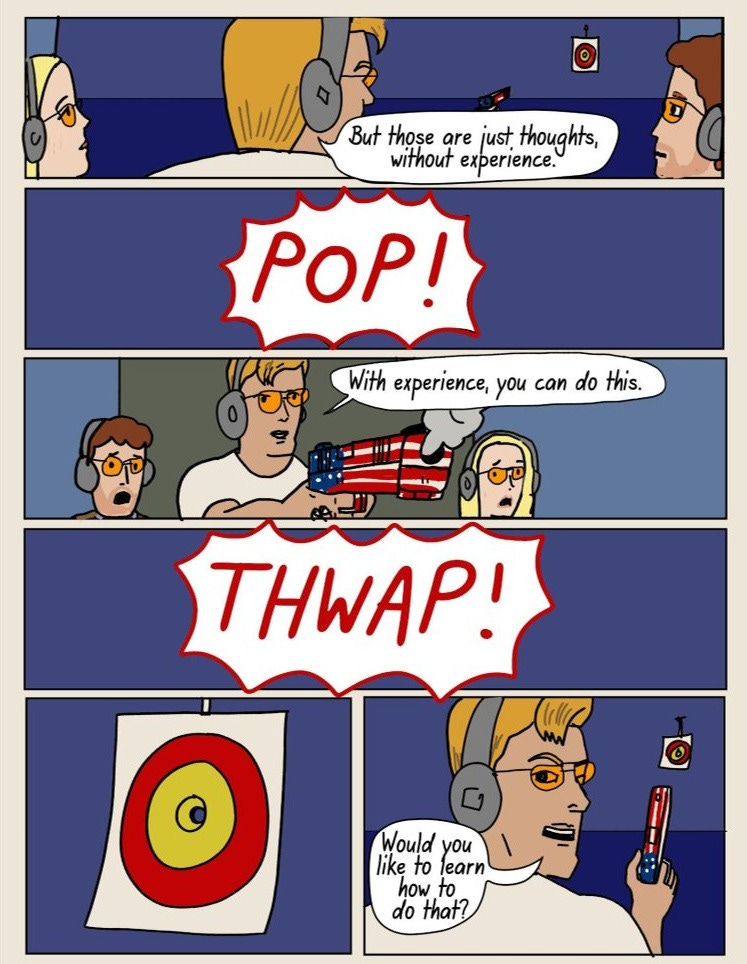
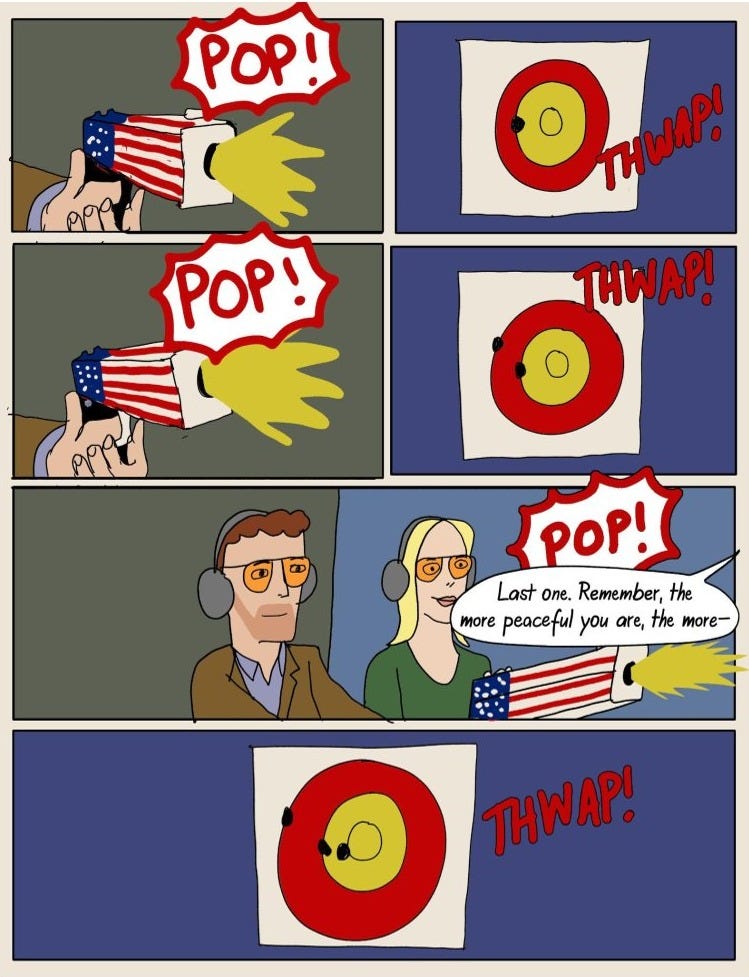
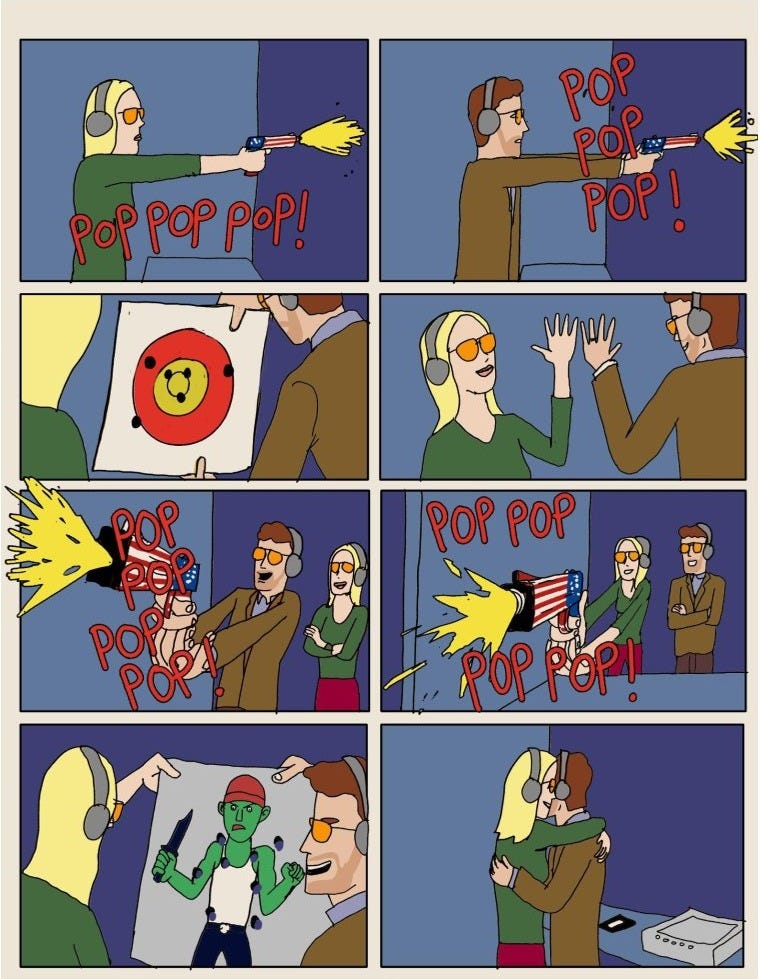

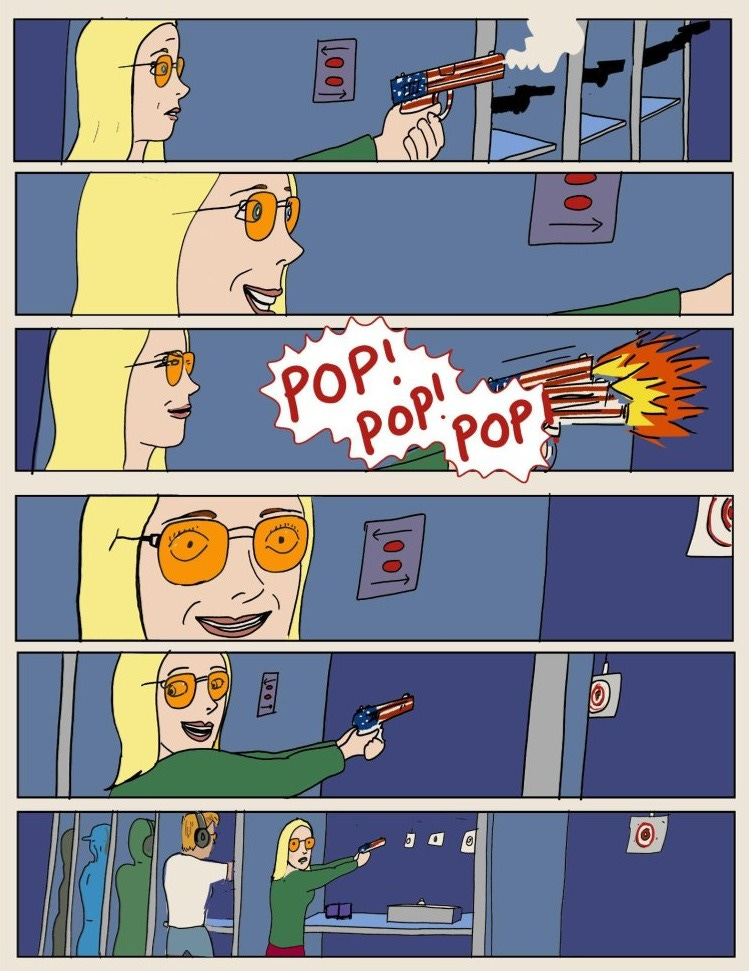
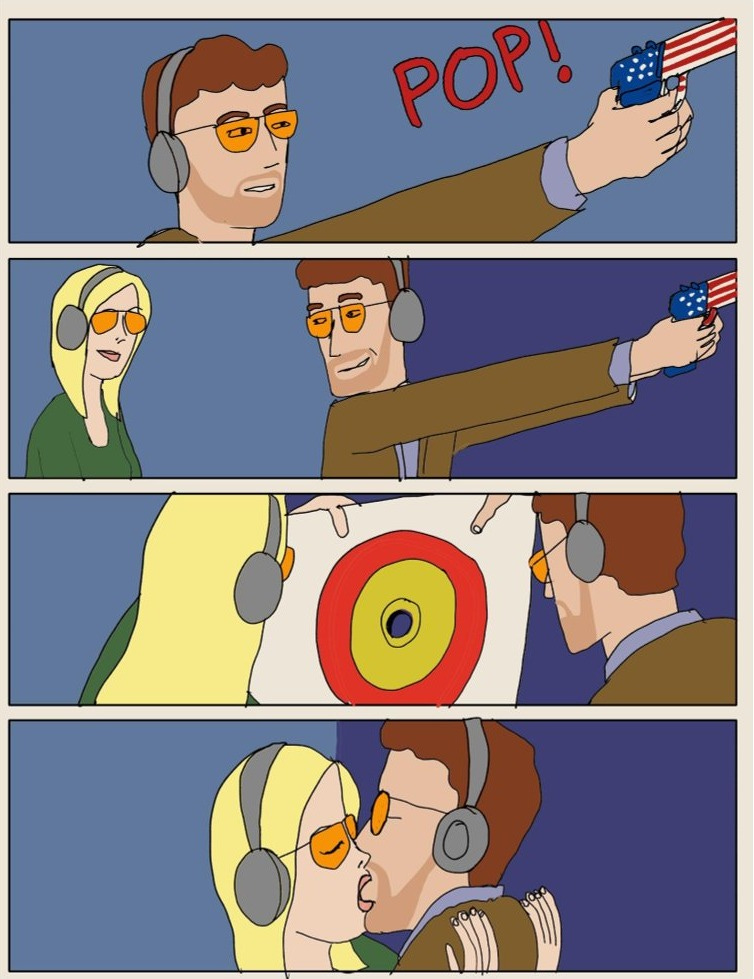
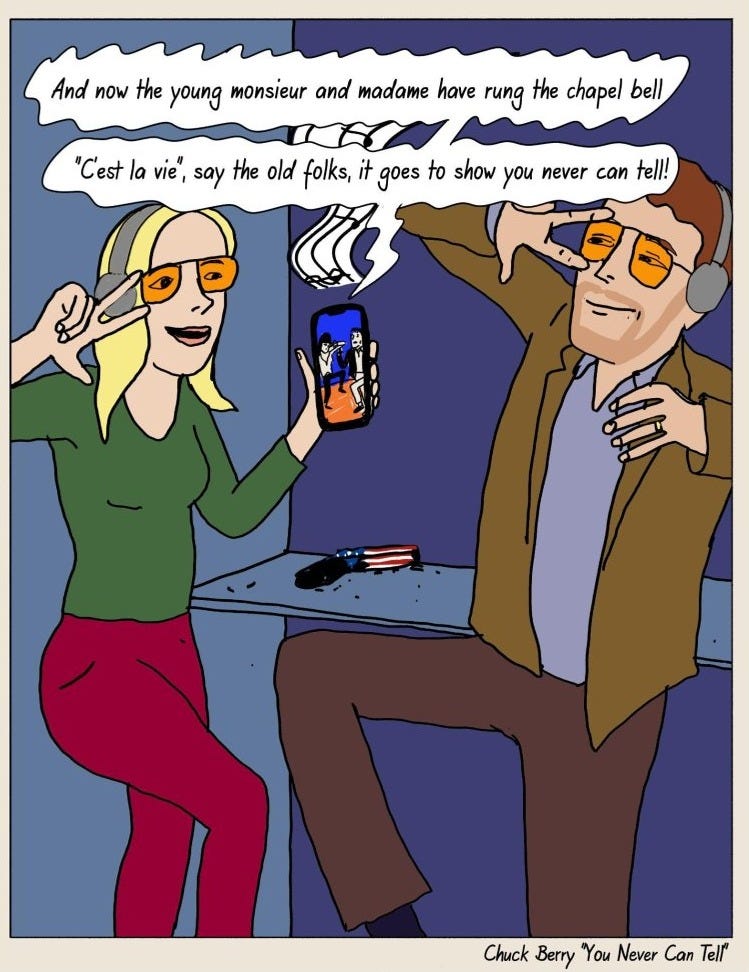
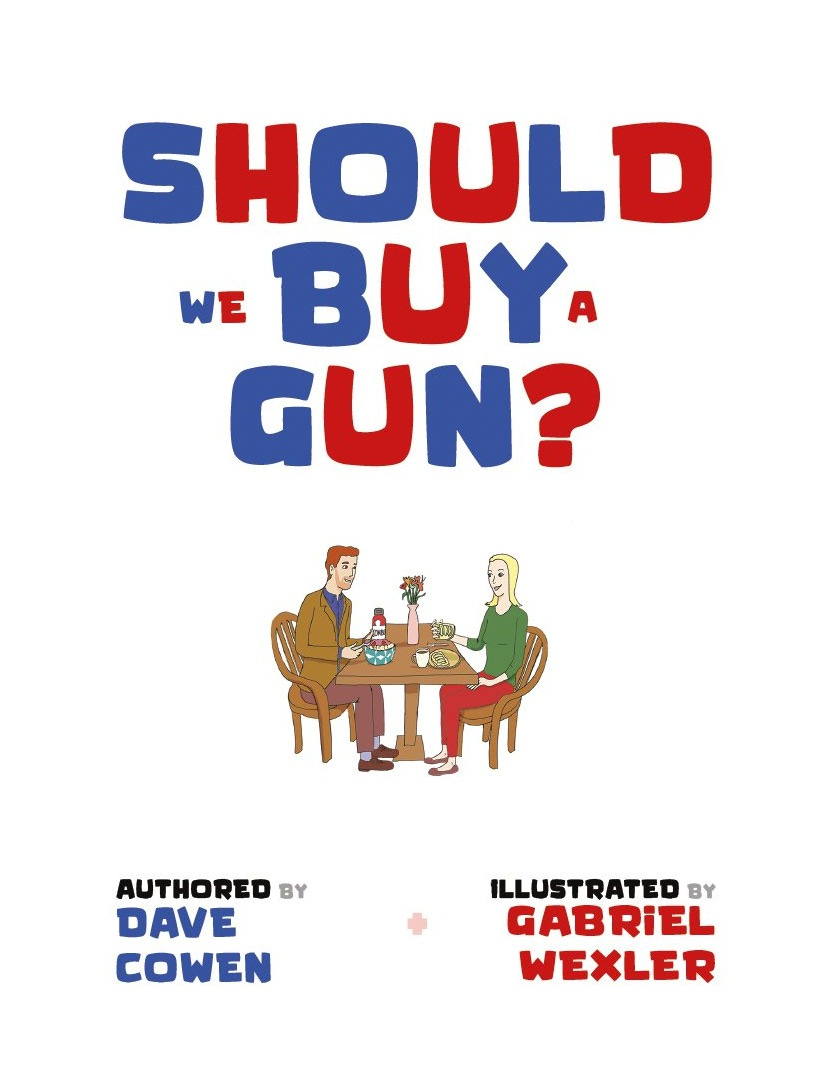
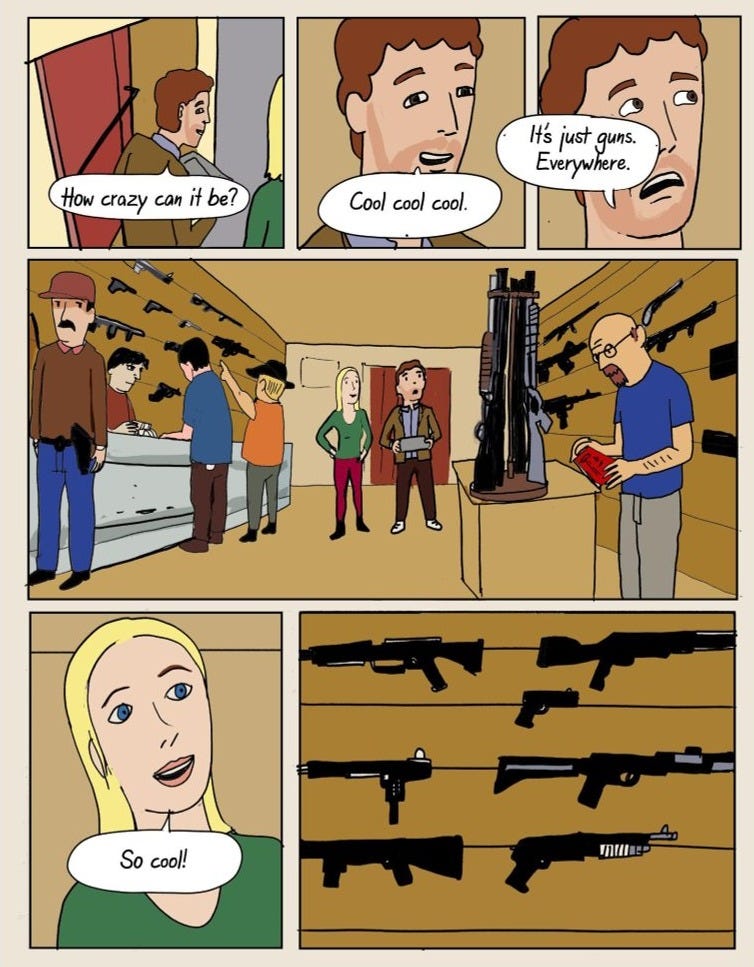




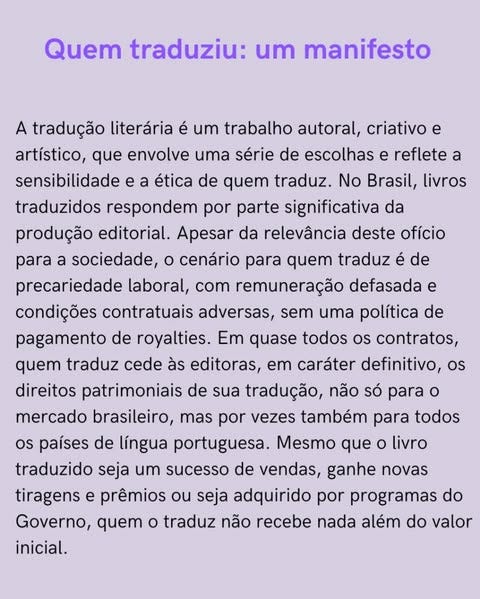










Excelente
Que conversa bacana, Érico! Já assinei o Substack do Dave.